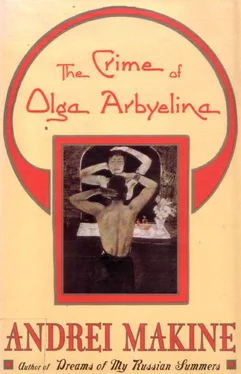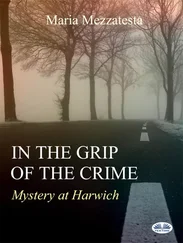It was she who saw in this testimony the destruction of everything she had built up, word by word, in her conversations with the magistrate. So Golets knew nothing about her winter nights. The threats he had made came down to that old secret of the estates sold by the prince. That was his ridiculous blackmail! While she, in her confusion, in her madness, had imagined this man lying in wait beneath their windows… No, he had seen nothing. But in that case his death that she had so desired, the murder she had confessed to the magistrate, was totally gratuitous. She had killed him for nothing…
Strangely, the magistrate listened to her this time with ill concealed impatience, frequently looking at his watch, acquiescing with a distracted air. And the clerk was absent. She insisted that she should be accompanied to the scene of the crime but met with a refusal, repeated her demand in categorical tones, explaining that they would be gathering crucial evidence for the truth, and finally she had her wish granted. Despite the late hour she went to the riverbank, found the exact spot where they had landed, indicated the position of their bodies on the grass, described the end of their meal… And suddenly noticed that she was alone on the bank, that the sun had long since set and that her explanations were being addressed to no one… In fact, they were being heard by several young ruffians who chased her, throwing lumps of clay at her and shouting obscenities.
It was probably on that evening, on the homeward path, that she met the stammerer. He told her they did not want his testimony either. And yet he had explained to the magistrate that Golets had kept himself to himself because he had a past to hide: as an army doctor he had been captured by the reds and had served in their army for two years… Thirty years ago.
They were standing facing each other in a street in the lower town that was already almost in darkness. She, her hair disheveled from running, her dress smeared with the mud thrown by her pursuers. He, small, frail, his face distorted by the impossibility of speech. Both of them felt intolerably mute. Finally he was able to gain control of the air stuck in his throat and exhaled in a painful groan, "Y-you-you k-k-killed him!"
After this encounter she did not go back home. It even seemed to her as if she never again saw the house tacked on to the wall of the Caravanserai. Inexplicably she had become this woman lying on a narrow, white bed in a small room where there was a smell of medicines in the air. Someone woke her, forcing her to abandon the comfortable absence of unconsciousness. She opened her eyes: she felt no surprise at seeing a man of about fifty, an inaccurate portrait, aged and tired, of her husband, and a grave, tense young man- the future portrait of her son.
Their appearance transported her into a distant life, a forgotten city, and, above all, into another body. They seemed not to notice that she had gone and continued to address this pale, immobile woman, deprived of speech. It was her husband who did the talking. She heard him from the depths of her fog, smiled at him, understood nothing… She had to sign a sheet of paper-the man guided her hand. When they took their leave her maternal instinct must have roused her from her unconsciousness. She heard her husband replying to her, "It's better like this. For him…" She understood that he was going to Russia and taking their son with him. "For a month or two," he said.
When the door closed behind them the memory of the previous days returned, or at least that of the cold, of the fragment of glass that had gone into the vein in her wrist so easily-a fragment of ice, it seemed to her, that put an end to the pain, to the stifling afternoon on the riverbank where the drowned man lay, to the clamor of the voices talking about her, forever talking about her…
One night she was able to get up, went out into the corridor, and, advancing in a rapid ethereal glissade, passed through the echoing, nocturnal building. Despite the darkness the rooms in it were full of animation. She heard cries of joy, sad conversations, secret meetings, sighs. After she turned one corner the corridor took on a new aspect; she saw old portraits on the walls in their faded gilt frames. Through a half open door waves of operatic music spilled out. A woman dressed in an ample party dress walked ahead of her. A motley, laughing group suddenly appeared in a brief shaft of light and vanished at once at the end of a passage… She already knew what there would be in the room whose door she slowly pushed open. The wood fire, the branches covered in melted snow, the big mirror, the bed that held the imprint of a body. She undressed and molded herself into the hollow, feigned sleep. A moment later a long, endless caress enveloped her, filled her body, began to dilate it… She interrupted it suddenly. Within an armchair pushed against the wall a heavy profile stood out in which there glinted an eye that was at once malevolent and obliging…
It was to escape this look that she hurtled along the corridors that had once more become monotonous. Hurried footsteps, sure of their strength, rang out behind her. The only refuge, she now remembered, was in that tiny room under the rooftops, the one whose narrow window looked out over a snow-covered forest… She could already make out the little, low door, seized the handle, shook it desperately. Expert hands, almost nonchalant in their calm brutality, stopped her, twisting her arms…
Her own cry woke her. So it had all simply been a long dream, tortuous and painful. The winter nights, that unspeakable love, the man hounding them from his armchair… She lifted her left arm-the scar was still red. Why had she done it, when everything was only a slow parade of ghosts? For she had learned, she did not know how (from the nurses' conversations, no doubt), that her son would not be coming back on the appointed date. Or perhaps he would not come back because she had opened her veins? Or perhaps she had wanted to die to escape the building from which there was no escape? For she was no longer in the hospital where her husband and her son had come to see her… Or perhaps, precisely, they had gone away because they knew she was going to end up here? The cut vein, the building, their departure. Or rather: their departure; the cut wrist; the building one cannot leave. No, in yet another order: building; desire to die; their departure… How simple and insoluble it all is. And yet if I went to the window and if I saw it snowing, perhaps I could… Wait, first there was that fragment of glass, the blood, but there was no ice to stop it…
She did not know that years were passing. Time wound slowly through the bowels of the building she was exploring, feeling her way, day after day. Not the building of the asylum, a banal, rectilinear construction where dwelled all those troubled souls, but the cavernous, changing building that had arisen in her sleep. Distilling the sounds, she learned to identify the music of a grand piano in a remote drawing room. She ran toward it, could already see the clusters of candelabra, caught the aroma of the food for a festive dinner… But the rooms suddenly grew dark, filled with smoke and the fragments of windowpanes crunched beneath her feet. She made her way into a devastated restaurant where a man with a fur hat pulled down over his brow was playing a triumphal tune, from time to time wiping away the drunken tears from his soot-stained face with a rapid gesture… She went out through a yard at the back, hoping to protect herself from the machine gun fire that suddenly started to riddle the wall. And found herself in a hotel room whose window opened out onto a hot southern night, onto the rustling of foliage in the humid, perfumed breeze… She wandered from one room to the next, occasionally ran into someone, embarked on a conversation with them and was never surprised if her interlocutor left her in midword, disappearing into a gallery that suddenly opened up at the end of a room…
Читать дальше












